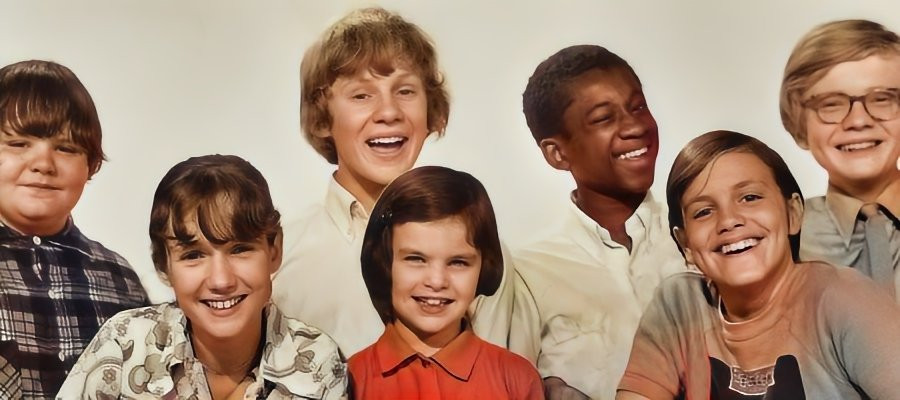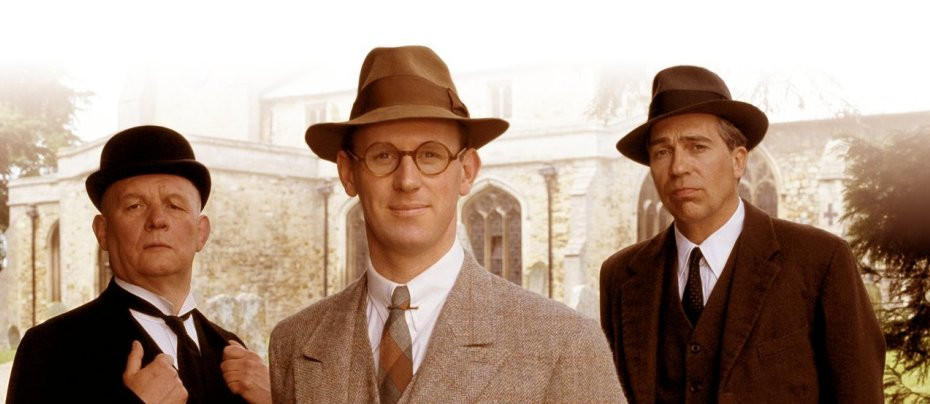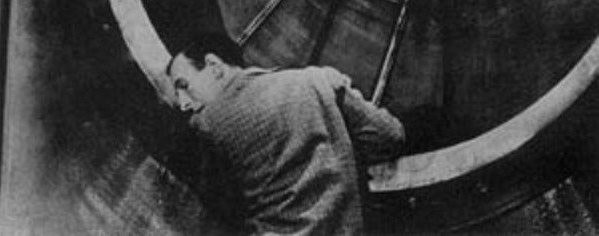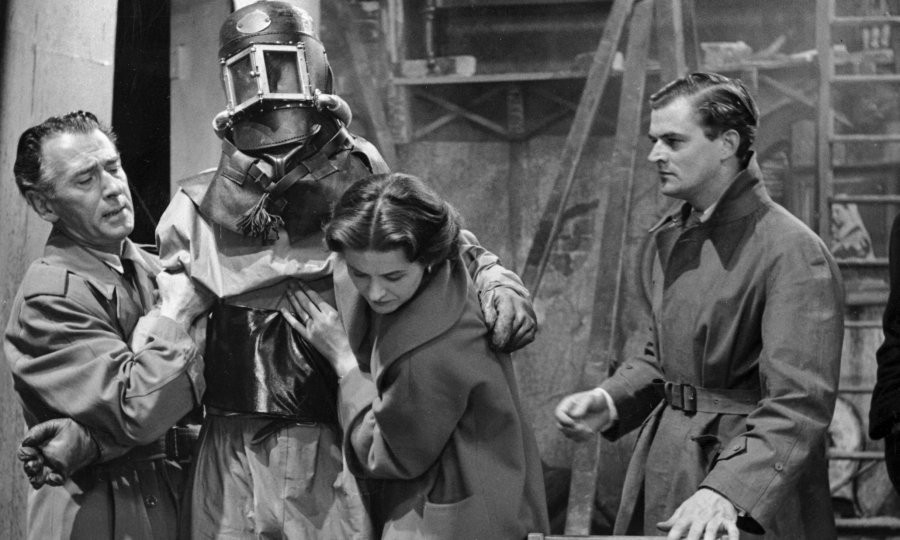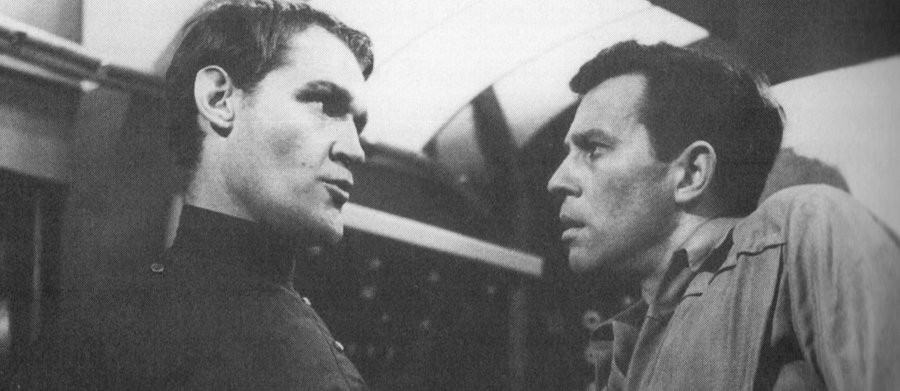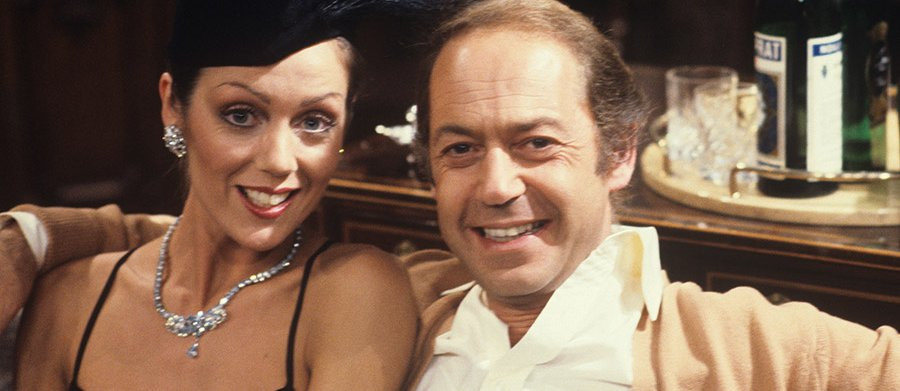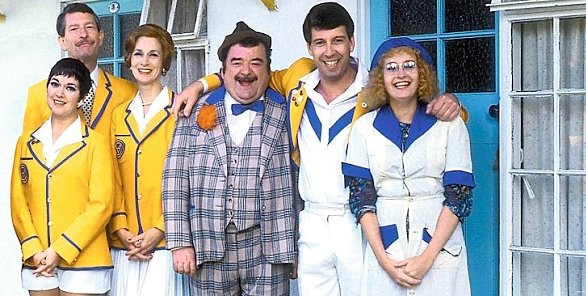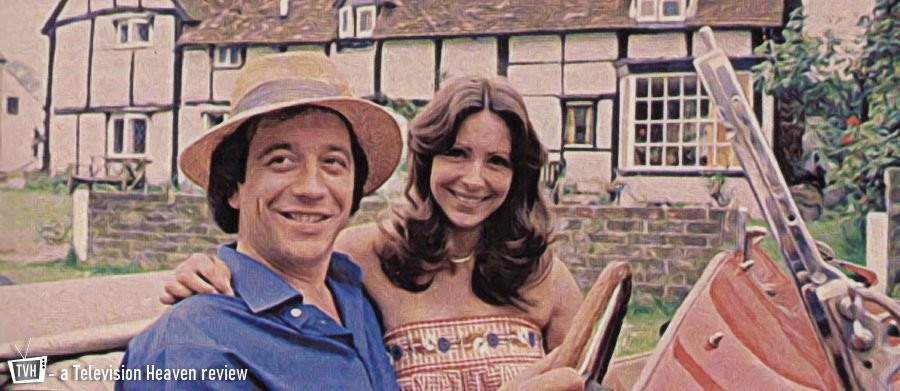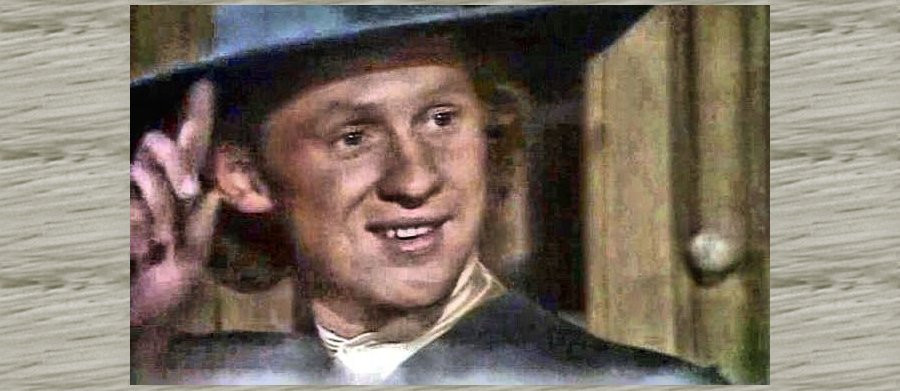
The Flipside of Dominick Hide / Another Flip for Dominick
1980 - United KingdomReview: Daniel Tessier
Canadian director Alan Gibson first came up with the rough idea for a time-travel drama in 1953. Only fifteen at the time, and preparing with his family for a holiday in England, conversation turned to the subject of flying saucers. A hot topic at the time, theories for the origins of UFOs ranged from high-tech military planes to alien spacecraft. Gibson had another idea: perhaps they were man-made machines from the future, sent back to observe us. On the flight home – an expensive treat in 1953 – Gibson stared out the window at the world below, and his idea of time-travelling observers looking down on us began to take form.
It would be over a quarter of a century before his idea would become the basis for a script. By 1980, Gibson had a strong career directing British television and cinema. He worked in many genres, but was best known for horror and thrillers, such as Hammer's 1970s productions Crescendo, Dracula A.D. 1972 and The Satanic Rites of Dracula. It is perhaps surprising then that his best remembered production would be a low budget, sweetly romantic television play for the BBC.
The Flipside of Dominick Hide took life when Gibson approached occasional Hammer screenwriter Jeremy Paul to help turn his idea into a workable script. It would take a few rejections before the concept was picked up by Keith Williams, the BBC's Head of Plays, to be made into an instalment of the long-running Play for Today strand. Already ten years old by this point and a reliable source of popular hits in many genres, Play for Today rarely featured science fiction. Perhaps this is why Dominick Hide worked well for the series. Neither Gibson nor Paul had any real technical knowledge or background in science or sci-fi (athough Paul had adapted two stories, The Dead Past and The Last Lonely Man for the sci-fi anthology series Out of the Unknown). In spite of the futuristic trappings, the story is first and foremost a romantic drama.
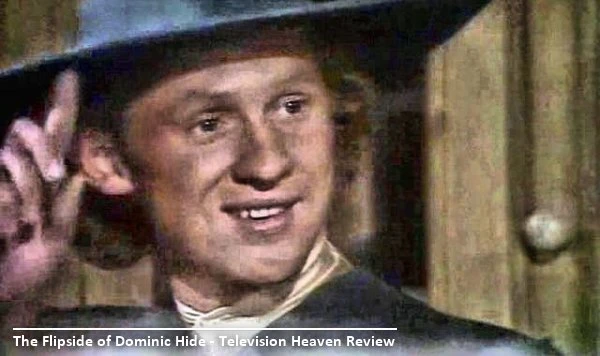
The ninety-minute play revolves around Peter Firth as the eponymous Dominick Hide. Living in London in the year 2130, Hide works as an observer on the “Flipside,” the era before the invention of time travel. His circuit is 1980, the same location a century-and-a-half earlier, which he observes from the air in a small, one-man saucer. The future of 2130 is a cold and austere one, where relationships are functional, little time is spent outside and even language seems to have become simplified and inexpressive. He lives with his wife, Ava (Pippa Guard), who works for the travel organisation Tomcook – clearly a descendent of the well-established but now liquidated travel agency Thomas Cook, placing this in a future which can certainly no longer happen!
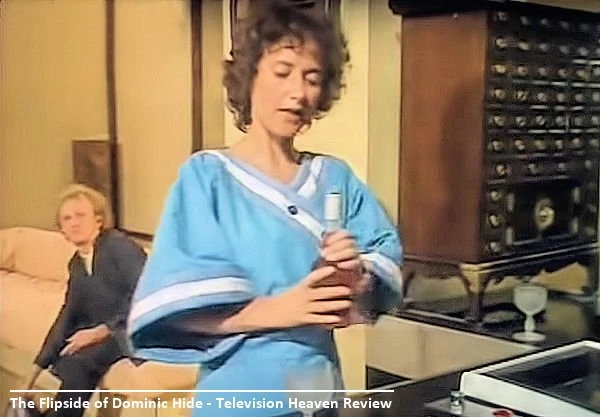
Dominick enjoys watching material from the 20th century with his family, including his Great Aunt Mavis (the great Sylvia Coleridge), who, it's implied, is old enough to remember life on the Flipside. He learns from her the existence of his great-great-grandfather, also called Dominick Hide, who allegedly lived near Portobello Road in 1980. Having previously been content to observe from above and report of transport systems, Dominick finds himself drawn to the London of the past and makes an illegal landing to attempt to find his ancestor.
What results is a charming fish-out-of-water story. Firth portrays Dominick as a good-natured and gently humorous man, fascinated with the world he finds himself in. Known as a child actor, Firth had become something of a television star in his first major adult part, the title role in Play of the Month's 1976 adaptation of The Picture of Dorian Gray. (Play of the Month featured adaptations of stage plays, unlike Play for Today's original scripts). Here, the 27-year-old Firth still has a very youthful air, which helps sell his naivety in the 1980s. Dressed in dark blue and gold fabrics and wearing a huge hat to protect from the dangerous rays of the future Earth, he is mistaken for a member of a religious order by those he meets. Given his mild-mannered and unshowy portrayal of a time-traveller, it's tempting to think he might have inspired the casting of Peter Davison in Doctor Who the following year. In fact, with his mane of blond curls, he looks rather like what you'd get if you stopped the regeneration from Davison to his successor Colin Baker halfway through!
Dominick is overwhelmed and seduced by the London of 1980, a much noisier, dirtier place than his own time. We learn a few secrets of the future from him as the story progresses, including something catastrophic due to happen in 1999, and although it is vague it's clear the world, or at least Britain, has been left damaged by events. Compared to his London, the Flipside is vibrant and full of character. Dominick ends up leasing his flying saucer to a fairground, which provides a useful hiding place but naturally creates its own problems.

His enquiries take him through the market on Portobello Road, where he meets Jim Bone (Timothy Davies), who takes him to the pub and introduces him to his friends. Dominick is immediately taken with Jim's unrequited crush Jane. She is played by the beautiful Caroline Langrishe, who had found success two years earlier as Cosette in the UK-US television film of Les Miserables. Put on the spot, and looking for another Dominick Hide, Dominick panics and takes the name Gilbey from a bottle of gin he spots behind the bar. The writers had hoped to wangle some bottles of Gilbey's gin from the distillers for their free advertising, but this didn't happen. They were, however, offered seats on the first commercial spaceflight held by Thomas Cook, so bad luck on that one.
While he returns to the future and his wife, Dominick is tempted to return to the Flipside to continue his search. Ava is distraught; landing in the past is strictly forbidden following a catastrophic change to history that occurred in an early jaunt. The potential for disaster and disciplinary action is real. Nonetheless, Dominick goes back, jumping between the time zones with the help of his coordinator Alaric (Trevor Ray) under the nose of his foreboding controller Caleb (prolific film actor Patrick Magee, perhaps best known today for A Clockwork Orange).
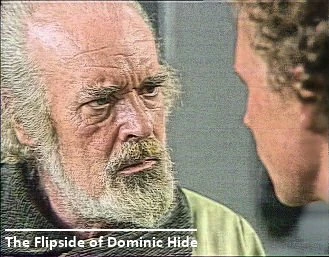
As he searches for his ancestor, “Gilbey” spends more and more time with Jane. It's full of sweet scenes where Dominick's unfamiliarity with twentieth century life trip him up. He can't even make a cup of coffee without fouling it up. His naivety draws Jane to him, but she falls for his sincerity and joy at the mundanities of eighties life, while Dominick falls for Jane's passion and realness, compared to the people of the 22nd century. In turn, Dominick's own passion is awoken, and he brings it back to his marriage, reviving his and Ava's love. It's all very sweet and restrained by today's dramatic standards, and all the more effective for it. As Dominick and Jane's affair blossoms into a relationship, he finds he must come clean to Ava, who is more accepting than might be expected. The story flirts with the idea of non-monogamy. As an aside, Alaric, who has become a close friend of Ava, settles down with a male partner. Quietly mentioning gay marriage and exploring polyamory isn't half bad for a TV play in 1980.
Anyone versed in time travel fiction will see the twist coming. Dominick is, in fact, his own great-great-great-grandfather, and Jane is pregnant with the Dominick who he was searching for. Realising just how dangerous his continued presence in his past is, and understanding how the controller has manipulated him from the beginning to ensure the causal loop, Dominick parts company with Jane. Not before knobbling a pools win for her, though, to make sure she and their son have a comfortable life. We leave Dominick and Ava, braving the outside, with their own son at the beach, mirroring Jane and Dominick Jr. at the same beach over a century earlier.

Dominick Hide is a gentle, funny, and rather wonderful play. Sweet, yes, but never saccharine, it's a fine example of a straightforward but effective script brought to life by a strong central performance. There are some fine visual touches, with the enclosed and stagey 22nd century sets contrasting with the extensive location work of the 1980s. There's little in the way of futuristic effects, with Dominick's saucer being almost laughably simple, but there are some fun touches. Home entertainment of the future includes holographic orchestras, leading to a brilliant moment when Dominick walks straight into the band playing in a restaurant in 1980. They of course play “classical” music, mostly by John Lennon, adding a strange poignancy when the singer was murdered only a day before the play was broadcast on 9th December. The most pervasive music though, is the play's theme song, Meal Ticket's “You'd Better Believe It, Babe,” which sets the gently romantic tone for the story, although it is drastically overplayed by the end.
Dominick Hide was a huge success on its original broadcast, garnering more positive viewer feedback than any other BBC play of that year. Critics were equally positive, with almost every review heaping it with praise. Although the story was perfectly self-contained, there was clear scope and demand for a sequel. In February 1982, The Flipside of Dominick Hide was repeated in readiness for the broadcast of Another Flip for Dominick the following week. Gibson once again directed with Paul co-writing. Two years has passed on both sides of the Flip. Dominick is now a respected teacher of time-travellers, and his desk job allows him more time with Ava, who has also become more passionate from his example. However, he is required to go back to the 1980s when one of his students, the wonderfully-named Pyrus Bonnington (Ron Berglas), has gone AWOL on the Flipside.

Dominick's exploits have become legendary, and Pyrus idolises him. Dominick tracks him down easily enough, now being more streetwise, but Pyrus has been seduced by alcohol and has found himself on the wrong side of the law. Worse than that, though, he is convinced he can change the past for good, something that could go catastrophically wrong. Dominick, though, can't resist looking up Jane and his son. Now living in a house in London with her musician boyfriend Duncan (Steve Alder), she is left alone when he conveniently goes on tour. Still, his presence is felt by his own TV performances, again involving members of Meal Ticket but performing as Chuck Farley, which at least mixes up the music a little.
While Dominick tries to justify his meeting with Jane as a necessary link with 1982, it's clear he is being drawn back into her life, and their affair starts up again quickly. This does not go down well with Ava, who is far less forgiving this time, her own emotions having been woken by Dominick and now with more to lose. In 2132, she faces temptation herself when the “Home Help” (Peter Cann) arrives, becoming a sort of replacement husband. Things don't run smoothly in 1982 either, as Dominick's relationship with Jane suffers. There's a harsher feel to the sequel, and the abuses possible with time travel are far more prevalent. Not only does Bonnington try to avert a terrorist event, laudable but doomed to terrible failure, but Dominick abuses his power when he travels back to repeat a date with Jane that had previously ended in a fight. When he admits this, the resulting fight is far worse, and for all his emotional awakening, Dominick can't understand why.
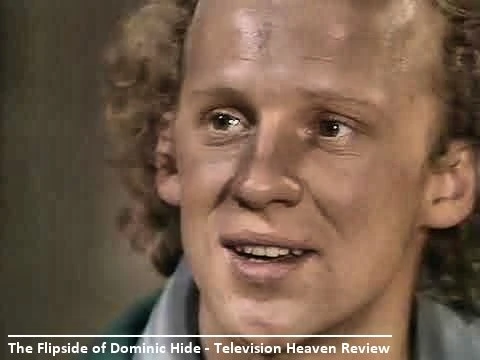
Dominick eventually returns to his own life and leaves the past behind, giving an already bittersweet story a poignant send-off. Along the way there's a diversion to rescue the stolen saucer from the effusive Professor Burrows (Michael Gough, still some time from his best known role as Alfred in the Batman films but already an established screen presence). While it does more with the time travel concept than the original, Another Flip isn't as effective or fulfilling as the first story. Indeed, revisiting the concept undermines the subtle power of the original's ending. Still, Another Flip is an enjoyable drama, once again enlivened by Firth and Langrishe's fine chemistry.
Firth went on to find stardom on both television and film, most popularly as Sir Harry Pearce in the BBC spy drama Spooks (2002-11). Langrishe became best known for her role as Charlotte in Lovejoy from 1993-4. Another Flip for Dominick was Patrick Magee's final performance, and he passed away in August 1982, only months after its broadcast. Alan Gibson died in 1987, aged only forty-nine.
Although there was some suggestion of further exploits for Dominick or other time travellers, there were never any real plans to take the story any further. The popularity of the first play led to the short-lived Play for Tomorrow series, which was broadcast only weeks after Another Flip had aired, exploring other visions of the future. The two plays were released together on video in 1991 and DVD in 2005, receiving their only BBC TV repeat the following year. In spite of its rarity, The Flipside of Dominick Hide, and to a lesser extent, its sequel, remains a beloved play with something of a cult following, a charming blend of science fiction, romance and humour.
Daniel Tessier
Dan describes himself as a geek. Skinny white guy. Older than he looks. Younger than he feels. Reads, watches, plays and writes. Has been compared to the third, fourth, fifth, sixth, seventh, eighth, tenth, eleventh and twelfth Doctors, and the Dream Lord. Plus Dr. Smith from 'Lost in Space.' He has also had a short story published in Master Pieces: Misadventures in Space and Time a charity anthology about the renegade Time Lord.
Dan's web page can be here: Immaterial
Seen this show? How do you rate it?
Seen this show? How do you rate it?
Published on June 11th, 2020. Written by Daniel Tessier for Television Heaven.


